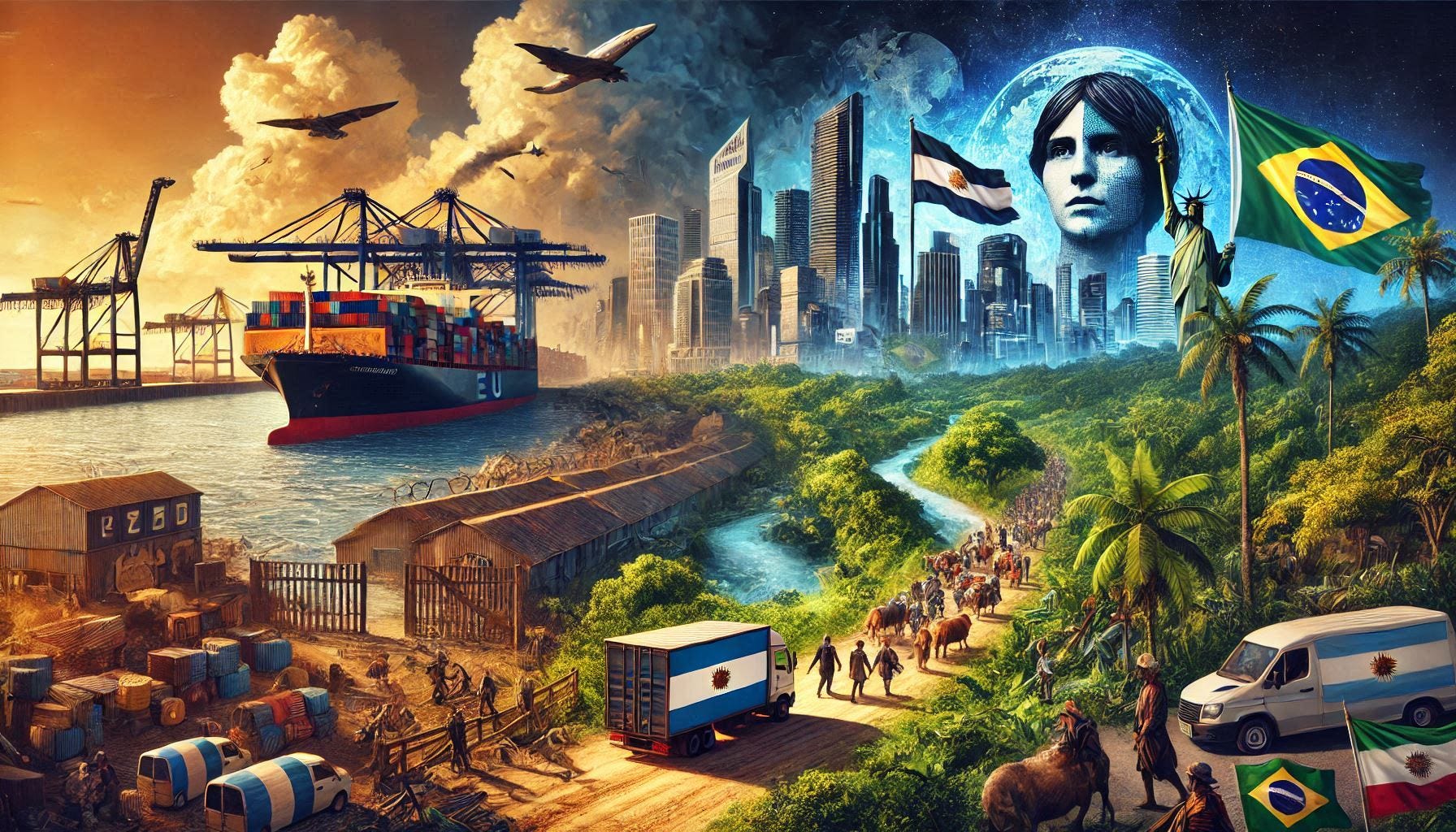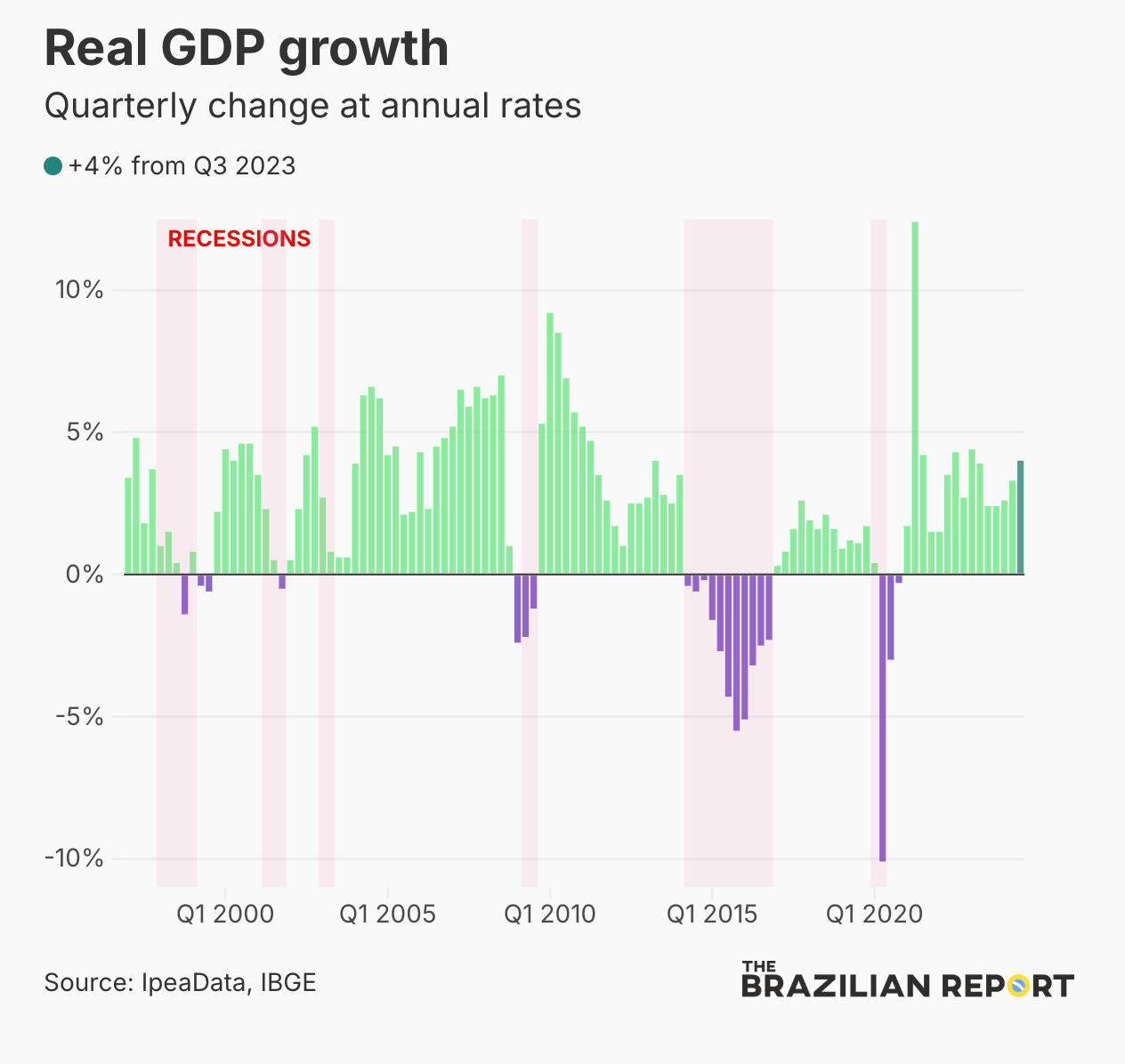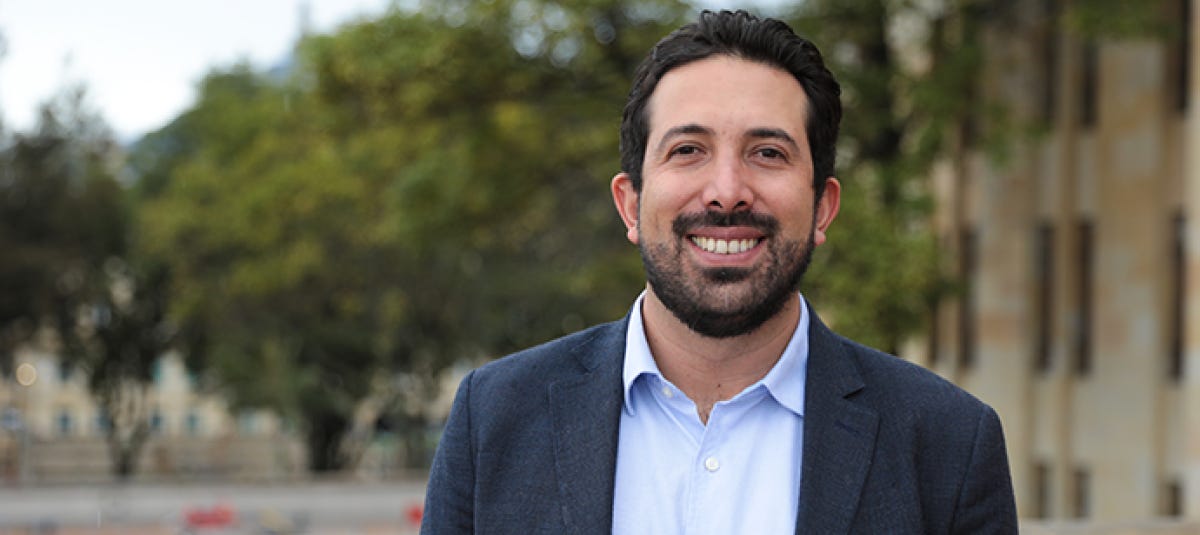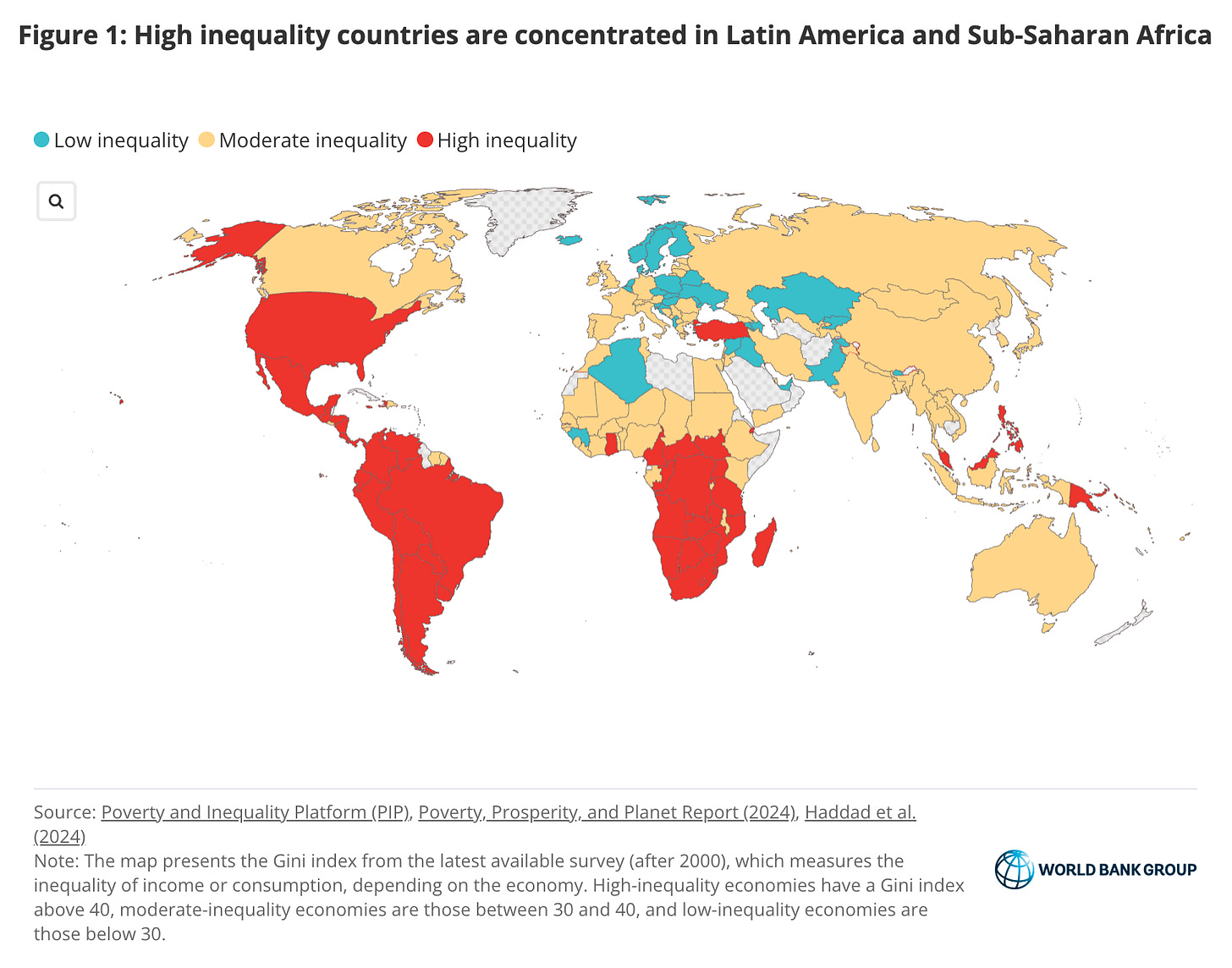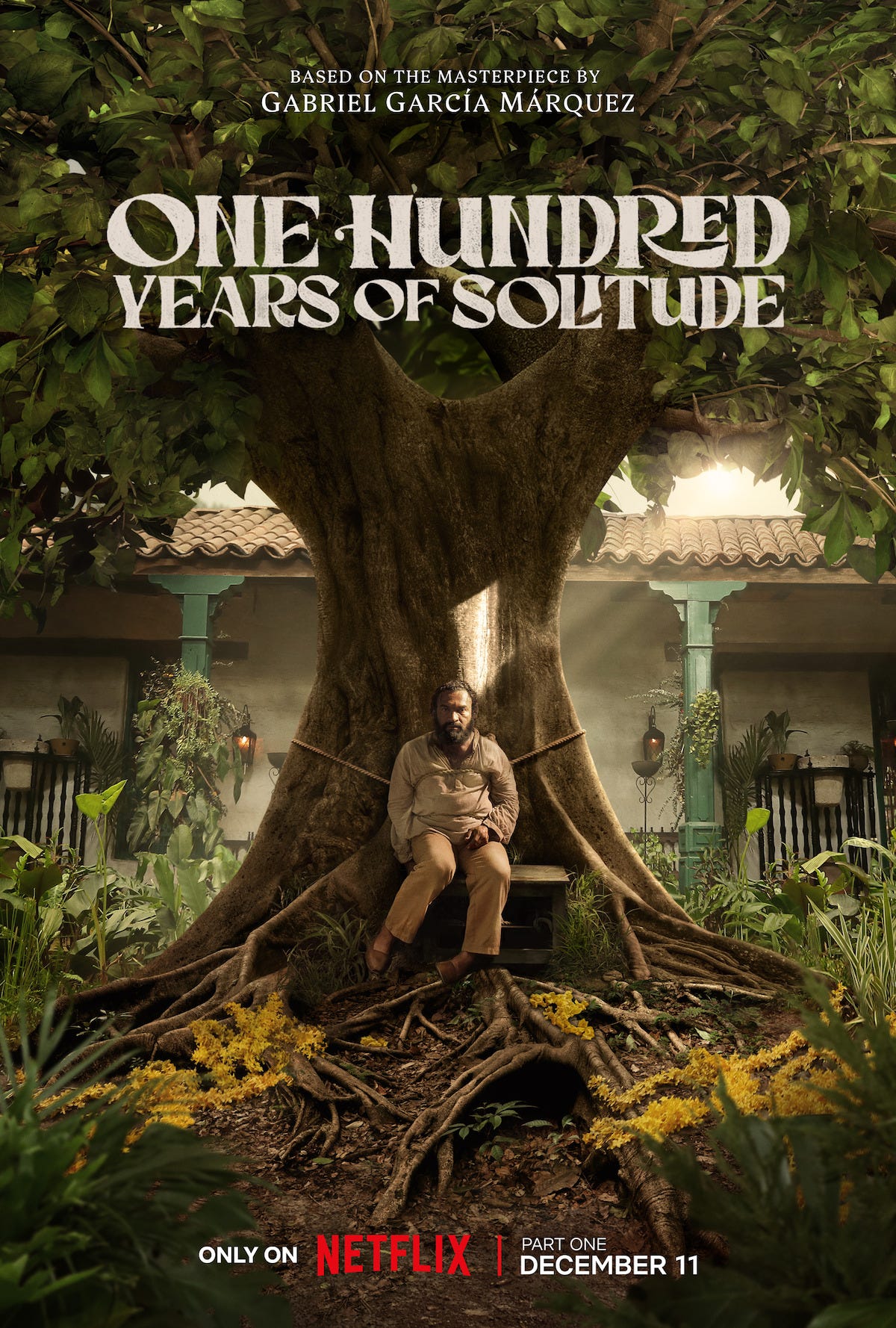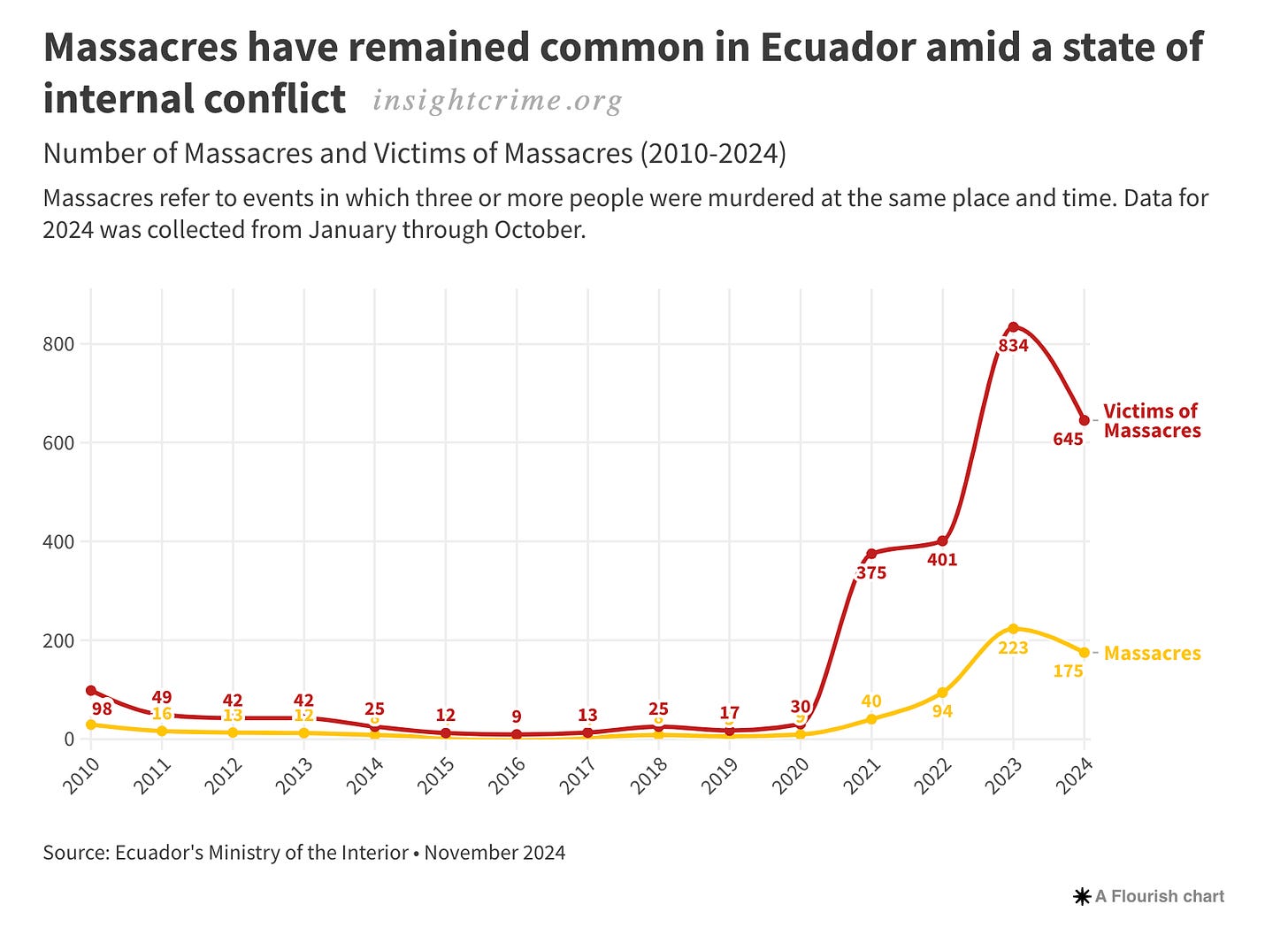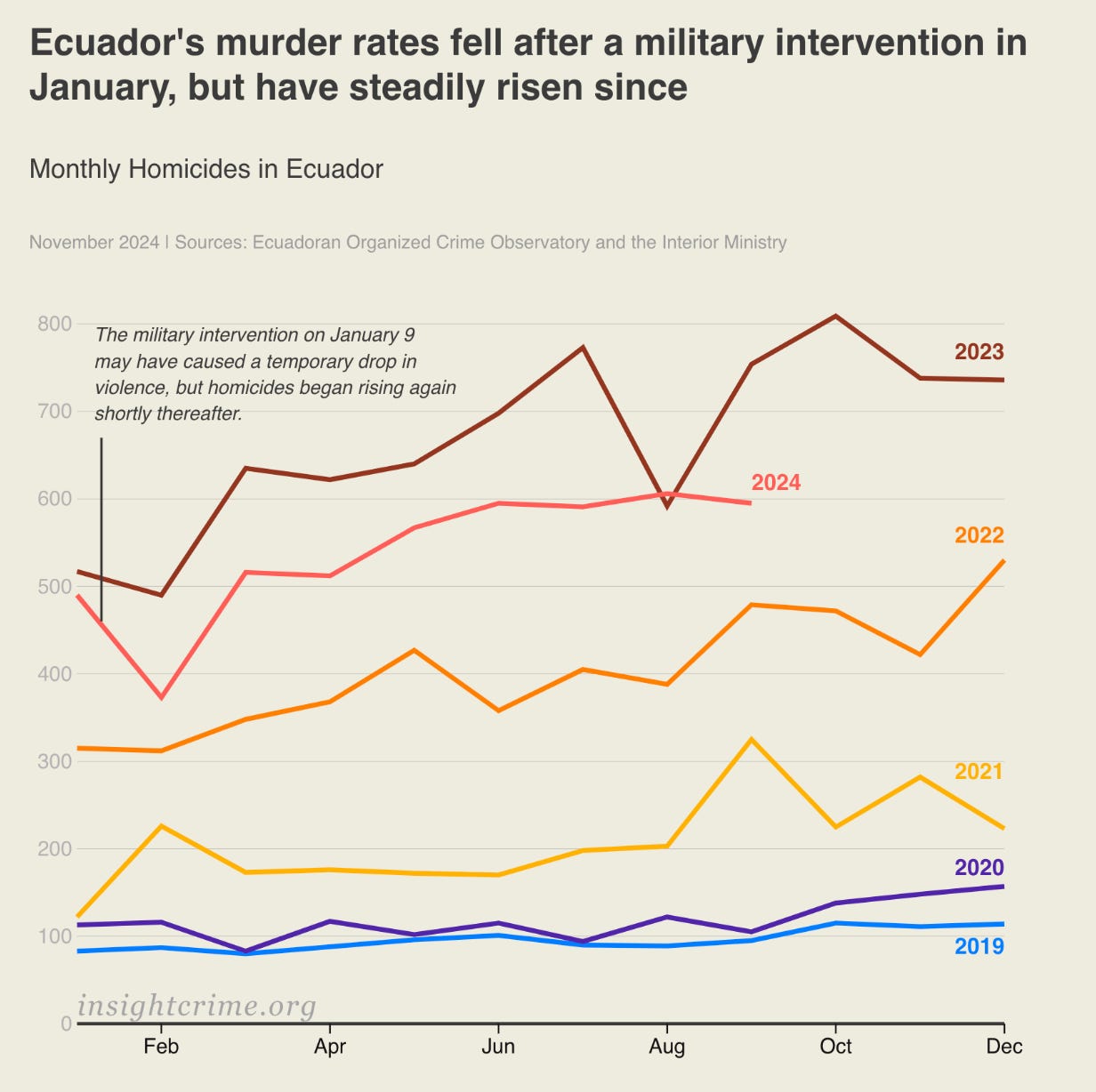Power Struggles & Trade Deal in Sight, in El Cafecito #11 del 6/12/2024
Key insights on Latin America's shifting dynamics in migration, trade, and regional conflicts – December 2024
As 2024 nears its end, Latin America remains a region of immense contrasts—where rapid economic growth in some areas coexists with rising instability in others. In this edition of El Cafecito, we take you through the latest developments, from the EU-Mercosur trade deal that could reshape global markets, to the deepening social divides in Argentina and Brazil's economic resilience amid political turmoil. We also dive into the escalating crises in Colombia, Ecuador, and Haiti, where conflict, crime, and inequality are pushing many to the brink. Whether it's political battles or economic resilience, the stories here reflect the complex web of challenges and hopes that define the region.
Join us as we unpack the most pressing issues shaping Latin America's future.
In this edition
Key insights and must-read articles on migration, trade, and regional developments:
EU-Mercosur: Finishing line in sight.
Financial inclusion: Some slow progress
Argentina: Cultural clashes under Milei.
Brazil: Economic resilience and challenges in Lula’s agenda.
Colombia: Economic Outlook, inequality, displacement, and the drug trade in focus.
Costa Rica: Impunity for sexual predators
Ecuador: The roots and evolution of its security crisis, and the threat to a small town’s ice-cream industry 🍦
Haiti: Silent exodus
Hopes for Mercosur
The EU and South American countries are close to clinching a long-delayed trade deal, reports the FT. Negotiations are under way on finalising a deal despite fierce opposition from French President Emmanuel Macron.
The paper notes that, with Trump’s arrival in the White House, Mercosur (which involves Brazil, Argentina, Uruguay, Paraguay and Bolivia) has an interest in selling more beef and agricultural products in the EU and reduce their reliance on China. The EU wants to open new markets for its carmakers and other industrial companies given Trump’s threat of tariffs and competition from China.
Banking the unbanked
Latin America is making progress on banking the unbanked, but there’s room to do more, argues The Economist. While 6 percent more Latin Americans had a bank account in 2021 than in 2014, about a quarter of Latin America’s population still does not have an account. This is less than in sub-Saharan Africa or South-East Asia, but more than in East Asia and the Pacific.
The Economist blames a distrust for banks and lack of financial literacy, especially given the high informality rate in the region. Yet, the pandemic changed things for the better, and a growing private fintech market is playing its part. But challenges to full financial inclusion in Latin America remain — and lack of inclusion hampers growth and exacerbates poverty. It concludes that, as the whole region “continues to grapple with slow growth and high poverty rates, expanding financial inclusion in 2025 will continue to offer significant benefits”.
Argentina’s culture war
Argentinians cry for Evita as Milei tries to eradicate Peronism, writes The Times, adding the libertarian government hints it may demolish a building with murals of Eva Perón, but “attacking the ‘spiritual leader of the nation’ may be a step too far”
Brazil’s economy
Brazil’s economy beats forecasts again as consumers spend big, with a 0.9% increase in GDP in July-September on the back of robust domestic demand. Record low unemployment and higher wages have propelled growth this year, giving President Luiz Inacio Lula da Silva reason to argue he’s delivering on pledges to better the lives of working Brazilians. But analysts worry that Lula’s spend-and-grow recipe for economic progress is reaching its limits, with investors demanding that government get public accounts in order (Reuters).
Bolsonaro may need his Trump card, writes America’s Quarterly. Brazil’s former President Jair Bolsonaro still has hopes of running in 2026, and will probably appeal for help from the next occupant of the White House. Accused of charges related to an attempted coup d’état, violent abolition of democracy, and participation in a criminal organisation, he could go to jail if proved guilty. He’s already facing ineligibility until 2030.
Coffee prices are at a 47-year high following tightening supplies as next year's crop in top grower Brazil struggles to recover fully from this year's drought (Reuters). Dealers also said some Brazilian farmers have delayed deliveries of this year's crop in the hope of securing even higher prices, leading to short-term supply tightness and large financial losses for traders who had been expecting to receive the coffee.
Deforestation is costing Brazilian farmers millions - without trees to circulate moisture, the land is getting hotter and drier (The Economist). The practice of clear-cutting (removing all trees from a given area) in the Brazilian Amazon led to reduced crop yields, resulting in total economic losses of around US$1bn between 2006 and 2019, according to a study by the Federal University of Minas Gerais (UFMG) and Rainforest Foundation Norway (RFN)
France-based supermarket giant Carrefour’s support for French farmers’ protests against a trade agreement between the European Union and the South American bloc Mercosur has sparked a strong reaction in Brazil, including a refusal to supply beef to Carrefour stores in Brazil (AP). Though France makes up just a tiny sliver of Brazil’s beef exports, meatpackers worried that Carrefour’s decision would hurt its reputation in other markets.
Colombia round up
More trouble for Gustavo Petro
Finance Minister Ricardo Bonilla's noisy resignation last night is hurting Petro's political project, writes El Pais. Bonilla is leaving in the face of the corruption scandal affecting the National Risk Management Unit (UNGRD). But for Gustavo Petro “he was not just any economist— he was a central figure in his political project”. The 75-year-old academic was “one of the few officials in whom Petro fully trusted”.
His resignation came at a time when Bonilla was trying to secure the resources to finance the national budget deficit next year. Diego Guevara, his Deputy, has been appointed the third Finance Minister in Petro’s 2 years in office. He is understood to have to push through a tax reform before the end of the year to raise 12 billion pesos and finance the 2025 budget (El Tiempo).
The scandal at UNGRD, the disaster risk agency, has spread across the government in recent months, with the agency’s former director and deputy director under investigation.
The FT adds that the “probe into the disaster risk agency comes amid a parallel investigation into the Petro campaign’s finances ahead of the 2022 election that he has characterised as a “coup” attempt by elites”.
Colombia’s economic outlook
In its latest Economic Outlook, the OECD forecast the economy will grow by 1.8 percent this year, with a gradual recovery to 2.7 percent in 2025 and 2.9 percent in 2026. Investment will continue recovering as financial conditions ease, though uncertainty will keep it below pre-pandemic levels.
Given high planned fiscal deficits, which do not leave margin for risks, and recent revenue shortfalls, the OECD calls for fiscal prudence and compliance with the fiscal rule. In the medium term, it suggests Colombia undertakes a “comprehensive tax reform to rebalance the tax burden” from corporate to personal income, reduce tax expenditures, simplify the tax system, and tackle tax evasion.
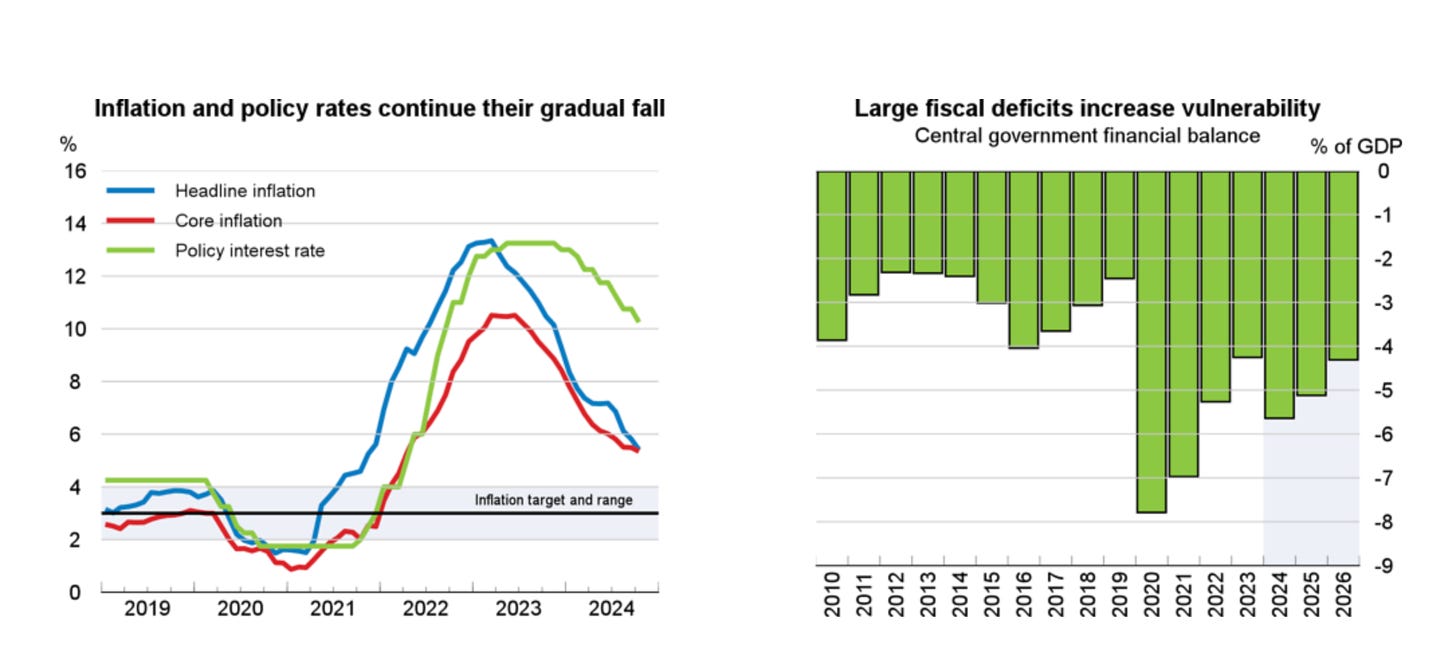
The third most unequal country on earth
A report released this week by the World Bank argues inequalities are threatening the social progress of recent decades in Colombia, with the country the third most unequal country in the world behind South Africa and Namibia.
The country's progress, spurred by the oil revenue boom at the beginning of the century, reduced poverty from 50 percent in the last century to the current 33 percent. Yet, inequalities have barely changed over time. In Colombia, more than 44 percent of inequality in wages is determined by circumstances at birth. Land is concentrated in the hands of very few citizens. And research shows that the country's exposure to international trade, starting in the 1990s, has sharpened the concentration of wealth.
Colombia’s peace negotiations
Colombia’s president had a bold peace plan, but it is not working (The Economist), adding that negotiations “that are not backed up by military muscle merely let armed groups expand”.
While murder rates fell slightly last year, probably in part thanks to the temporary ceasefires, kidnappings are up, and threats and extortions have soared since Gustavo Petro took office. The government “lacks credibility, failed to take control of many areas that used to be controlled by the FARC, and its approach also lacked muscle’.
We are covering the Colombian conflict in detail this winter in our three-part series ‘Echoes of Conflict, Hopes for Peace’, catch up here:
Conflict and displacement
The AP reports on the displacement of indigenous people in Colombia, victims to conflict and poverty. In Bogotá, there are still around 1,600 indigenous people - 600 of them children - in an unhealthy shelter waiting to be relocated to their own land or returned to their territory with guarantees of education, health and security.
They are among the thousands of displaced people in Colombia. According to the Norwegian Refugee Council, 1.5 million people have been displaced in the country since 2016, driven mainly by security reasons such as threats, armed conflict, land dispossession and anti-personnel mines. Colombia has the world’s largest population of displaced people with rural families uprooted by land seizures, threats, and atrocities.
Colombia’s narcos
A Colombia-led operation seized a record 225 tonnes of cocaine last week, uncovering a new drug trafficking route to Australia via ‘narco submarines.’ Over six weeks, authorities halted six semi-submersible vessels and confiscated 1,400 tonnes of drugs, including 1,000 tonnes of marijuana. The crackdown also led to over 400 arrests and disrupted weapon smuggling and human trafficking networks.
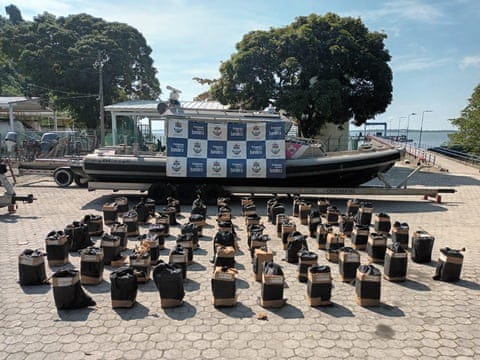
Beyond “Narcos”
An adaptation of Gabriel García Márquez’s “One Hundred Years of Solitude” will premiere on 11 December on Netflix.
García Márquez’s novel, published in 1967, has sold more than 50 million copies and been translated into more than 40 languages. This adaptation is one of the most ambitious productions in Latin American history, filmed in Spanish and shot in García Márquez’s native Colombia with the support of the author’s family. The series consists of 16 episodes in total, and will be released in two parts of eight episodes each.
Costa Rica
The country is a paradise of impunity for sexual offenders (El Pais). Data from the Public Prosecutor's Office show that, in 2023 alone, 68 women were victims of sexual crimes each day, 76 percent more than the previous year. Only 15 percent of complaints made last year resulted in formal charges.
Costa Rica's worldwide reputation as a green country brought a record 2.5 million tourists last year, yet “many tourist destinations barely have public services”. State neglect and a party culture that attracts young visitors are to blame, along with the “prevalence of sexual predators and drug traffickers”.
Cuba’s troubles
Cuba faces one of the worst tourism crises in its history (Infobae). According to a report by Cuba21, between January and October this year, the country received only 1,718,636 tourists, a decrease of 48.23 percent compared to the before the pandemic — far from the 3.5 million visitors projected by the government for this year. Hotel occupancy has plummeted to 25 percent. The drop in tourism has affected almost all key markets.
Cuba’s national grid collapsed again on Wednesday after the country’s largest power plant failed, leaving millions without power writes The Guardian. Cuba’s oil-fired power plants, already obsolete and struggling to keep the lights on, reached a full crisis this year as oil imports from Venezuela, Russia and Mexico dwindled, contributing to multiple nationwide blackouts in the last two months. The capital, Havana, was “almost completely in the dark” on Wednesday.
Ecuador: Crime, Crisis, and Power Outages
Ecuador’s recent massacres highlight the deadly mix of high-powered weapons, impunity, and fragmented criminal networks, notes InsightCrime. On December 1, ten people, including nine Colombians, were killed in El Oro. Days earlier, a shooting in Durán claimed three lives and injured three others. Mass killings, defined as incidents with three or more victims, have steadily risen since 2020 and remain near 2023 levels, despite a state of internal conflict and a military crackdown on organised crime.
Despite President Noboa’s security crackdown, massacres persist, underscoring the power of criminal gangs. Ecuador’s economy remains weak, compounded by an ongoing energy crisis. While Noboa is poised for re-election in February, criminal groups have regained strength after retreating earlier this year.
Ecuador’s security crisis stems from its prison system, where failed reforms and corruption allowed “mafias” to thrive (InsightCrime). These groups used prisons as bases for multi-million-dollar criminal markets, making them a cornerstone of Ecuador’s criminal economy.
Power shortages in Ecuador are melting away the future of a small town’s ice-cream industry, reports AP. President Daniel Noboa, elected last year in a special election that followed the resignation of Ecuador’s previous president, has not been able to solve the electricity crisis. which is deepening the economic crisis. The chamber of commerce in Guayaquil, Ecuador’s largest city, estimates that power outages are generating weekly losses of US$700 million for Ecuadorian businesses.
Haiti’s silent exodus
Violence in Haiti escalated further following the inauguration of Prime Minister Alix Didier Fils-Aimé on November 11. Armed confrontations in Port-au-Prince killed or injured more than 35 suspected gang members on November 20. The Haitian economy, already weakened by years of crisis, has been further affected by the violence and the country faces one of the most complex moments in its recent history.
Such extreme violence and poverty continue to drive the exodus of Haitians. El Pais has a piece on those taking to the sea using rafters to leave. Uncertainty over deportations from the Dominican Republic and the likely end of humanitarian permits in the U.S. with the arrival of Donald Trump are strong push factors (El Pais).
Mexico’s infrastructure investment
Mexico's huge commitment to the return of trains to boost its economy (BBCMundo), as part of the infrastructure works promoted by President Andrés Manuel López Obrador (2018-2024).
Enjoyed this edition?
Share El Cafecito with friends, colleagues and family who care about Latin America!
Don’t miss…
As Donald Trump prepares to retake the White House, his threats of tariffs and hardline immigration policies are already shaking the foundations of Latin America. On Sunday we’ll explore how they’re already affecting policies across the region — and beyond.




